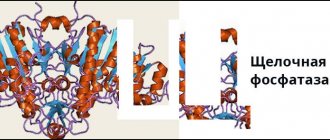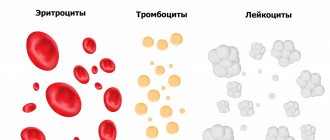Detailed description of the study
Calcitonin is a hormone produced by the C cells of the thyroid gland. Its main function is to regulate mineral metabolism in the body.
Maintaining calcium levels within physiological limits is achieved through a balance between its absorption in the intestines, deposition in the bones and excretion from the body. The balance of these processes is provided by many hormones. The role of calcitonin is to prevent excessive increases in calcium concentration in the blood. This hormone acts on cells that destroy bone tissue (osteoclasts), slowing down the process of bone resorption.
Calcitonin receptors are found in many other organs, including the brain, kidneys and intestines. Secretion of the hormone occurs in response to an increase in calcium concentration in the blood. Its secretion is also stimulated by excess production of gastrointestinal hormones such as gastrin.
A change in calcitonin levels is observed in primary osteoporosis, which develops as an independent disease and is not associated with other pathology. Another reason for the increase in its concentration is medullary thyroid cancer. This is a fairly rare cancer that usually develops as part of a hereditary syndrome called multiple endocrine neoplasia. With this pathology, damage to the adrenal glands and other glands is observed.
Medullary thyroid cancer is often asymptomatic until the tumor spreads to other organs, that is, metastases appear. Its detection occurs accidentally during an ultrasound examination, where the node is visualized. As the disease progresses, a person may notice an enlargement of the lymph nodes in the neck, problems swallowing food, and hoarseness due to compression of the lumen of the esophagus, trachea, and nerves and vessels of the neck by the tumor.
Assessment of calcitonin levels is an important indicator in the diagnosis of medullary thyroid cancer, osteoporosis, in conjunction with other indicators of mineral metabolism in the body. Rarely, changes in calcitonin concentration may be observed in tumors of other locations.
Indications for the study
The level of calcitonin synthesis in the thyroid gland is directly proportional to the amount of calcium in the blood plasma.
This hormone has a fairly short half-life - from 2 to 15 minutes. Calcitonin is a functional parathyroid hormone antagonist. Parathyroid hormone promotes the removal of calcium from bone tissue into the blood, accordingly increasing its content in plasma. Calcitonin and parathyroid hormone maintain the body's calcium-phosphorus balance, which plays a critical role in regulating bone density.
It is the effect on calcium metabolism that makes calcitonin analysis extremely important if primary osteoporosis is suspected (in secondary osteoporosis, the hormone level does not decrease). But first of all, a deviation from the norm in the patient’s blood makes it possible to identify malignant neoplasms in the body at an early stage.
Doctors prescribe patients to donate blood for calcitonin in the following cases:
- disturbances of phosphorus-calcium metabolism in the body (most often this may be a consequence of increased or decreased production of parathyroid hormone);
- suspicion of osteoporosis (increased bone fragility, fractures, presence of bone deformities), the analysis is more often prescribed to women, because their risk of osteoporosis is much higher than that of men;
- pheochromocytoma (a tumor most often localized in the adrenal glands and causing significant jumps in blood pressure);
- suspicion of a malignant thyroid tumor - medullary carcinoma, which can cause a significant increase in calcitonin levels. The presence of such a diagnosis in one of the patient’s blood relatives can also serve as an indication for research - to exclude a possible genetic predisposition of the patient to the development of tumors of this type;
- after a diagnosed increase in the size of the thyroid gland and in the presence of nodules on it. Enlarged regional lymph nodes may indicate the need for this test;
- in the process of preparing the patient for surgical removal of a tumor (medullary carcinoma) and during the postoperative period.
References
- Osteoporosis. Clinical recommendations. — Russian Association of Endocrinologists, 2021. — 107 p.
- Felsenfeld, A., Levine, B. Calcitonin, the forgotten hormone: does it deserve to be forgotten. - Clin Kidney J., 2015. - Vol 8(2). — P. 108-187.
- Danila, R., Livadariu, R., Branisteanu, D. CALCITONIN REVISITED IN 2021. - ActaEndocrinol (Buchar), 2021. - Vol. 15(4). — P. 544-548.
- Toledo, S., Lourenço, D., Santos, M. et al. Hypercalcitoninemia is not pathognomonic of medullary thyroid carcinoma. - Clinics (Sao Paulo), 2009. - Vol. 64(7). — P. 699-706.
Preparatory stage
The patient should properly prepare for a calcitonin test as follows:
- It is necessary to donate blood for analysis on an empty stomach (avoid eating 12 hours before donating blood);
- eliminate fatty, spicy foods from your diet one day before;
- do not take oral contraceptives a month before the test;
- avoid heavy physical activity the day (24 hours) before donating blood for analysis, this also applies to emotional stress;
- immediately before donating blood, a 15-minute rest is advisable;
- You must not smoke 3 hours before the test.
Preparing for a calcitonin test involves the patient minimizing the influence of various factors that can affect the test result. Risk factors include:
- undergoing hormonal therapy with female sex hormones (estrogen);
- taking calcium supplements intravenously;
- alcohol consumption;
- significant physical activity;
- consuming significant amounts of carbohydrates, which increase insulin levels.
general characteristics
Peptide hormone. Produced by parafollicular C cells of the thyroid gland. Its physiological function as a parathyroid hormone antagonist is to inhibit bone osteoclast activity and reduce serum calcium levels. It may increase with benign lung diseases and during pregnancy. Gradually decreases with age. Typically, an increase in serum levels of both basal and stimulated levels of calcitonin during a provocative test with intravenous calcium administration serves as the main diagnostic criterion for medullary thyroid carcinoma, even in the absence of radioisotope diagnostic data, and correlates with the stage of the disease and the size of the tumor. An unfavorable prognostic criterion for medullary carcinoma after surgery is considered to be an increase in calcitonin levels > 150 pg/ml and a reduction in the time for a twofold increase in calcitonin levels from 2 years to 6 months.
Serum calcitonin
General information about the study
Calcitonin is a thyroid hormone produced in parafollicular cells (C-cells), one of the most important regulators of calcium-phosphorus metabolism.
The formation of calcitonin directly depends on the level of calcium in the blood: when it rises, the concentration of calcitonin increases, and when it falls, it decreases. Once in the blood, calcitonin quickly disappears from it; its half-life, according to various sources, ranges from 2 to 15 minutes. Osteocytes (bone cells) have special receptors, acting on which calcitonin increases the flow of calcium from the blood into the bones, which inhibits bone resorption (destruction, decrease in mineral density). Thus, the action of calcitonin is aimed at reducing blood calcium levels and inhibiting bone demineralization.
Calcitonin is a direct antagonist of parathyroid hormone (PTH), a hormone of the parathyroid glands. The effect of PTH is directly opposite to the effect of thyrocalcitonin, although it is also regulated by the concentration of calcium in the blood. It removes calcium from the bones to maintain its desired concentration in the blood. Calcitonin and PTH in a healthy person, interacting with each other, are in balanced quantities for the normal regulation of calcium-phosphorus metabolism, which is mainly responsible for bone density. Vitamin D3 plays an important role in regulating the PTH-calcitonin relationship. Thus, measuring calcitonin levels is primarily advisable in cases of disturbances in calcium-phosphorus metabolism caused by primary osteoporosis. It should be remembered that calcitonin levels must be assessed in conjunction with other markers of bone remodeling.
With secondary osteoporosis (which resulted from hypercortisolism, hypogonadism, thyrotoxicosis, hyperparathyroidism), the level of calcitonin does not decrease.
The calcitonin test is extremely important for the diagnosis of medullary thyroid cancer, including the detection of multiple endocrine neoplasia syndrome (MEN-IIa, Sipple's disease), which can manifest as medullary cancer, adrenal medulla tumor (pheochromocytoma), or parathyroid hyperplasia and hyperparathyroidism .
An increase in the concentration of calcitonin in the blood serum during a test with pentagastrin is the main diagnostic criterion for the presence of medullary thyroid carcinoma; the results of the study determine the stage of the disease and the size of the tumor. After administration of pentagastrin, calcitonin levels increase in almost all patients with medullary thyroid cancer. If it was already elevated, then during a test with pentagastrin it will increase 10-20 times. When the level of calcitonin is at the lower limits of normal or is not detected at all, and after stimulation with pentagastrin it increases significantly, but does not go beyond normal limits, an early stage of medullary cancer or hyperplasia of C-cells of the thyroid gland is suspected. In some patients, intravenous calcium supplements should be used as stimulation, since tumors may not respond to pentagastrin.
Calcitonin testing is prescribed after surgical treatment of medullary thyroid carcinoma to evaluate the results of the operation. In particular, it is recommended to take it in the late postoperative period to monitor whether the medullary carcinoma has metastasized and whether there is a recurrence of the tumor.
Since the secretion of calcitonin can be influenced by enzymes of the gastrointestinal tract (pepsin), glucagon produced by the pancreas, diseases of these organs (pancreatitis, acute cholecystitis, cirrhosis of the liver) can indirectly affect the synthesis of calcitonin.
What is the research used for?
- For the diagnosis of medullary thyroid cancer.
- To detect multiple endocrine neoplasia syndrome (MEN-IIa, Sipple's disease), which may manifest as medullary carcinoma, adrenal medulla tumor (pheochromocytoma) or parathyroid hyperplasia and hyperparathyroidism.
- To find out whether there are metastases of medullary thyroid cancer.
- For indirect assessment of the size of medullary carcinoma.
- To evaluate the outcome of surgery to remove medullary thyroid cancer.
- For the diagnosis of primary osteoporosis.
- For the diagnosis of hyper- and hypoparathyroidism.
When is the study scheduled?
- If medullary carcinoma is suspected (with nodular formations of the thyroid gland, an increase in its size, enlargement of regional lymph nodes).
- When diagnosed with pheochromocytoma, hyperparathyroidism to exclude multiple endocrine neoplasia syndrome (MEN IIa).
- Before and after surgery to remove medullary carcinoma.
- If one of the patient's relatives had medullary cancer.
- For symptoms of osteoporosis (bone pain, deformation and multiple fractures) for a comprehensive assessment of calcium metabolism disorders.
- For calcium-phosphorus metabolism disorders (hyper-, hypoparathyroidism).





